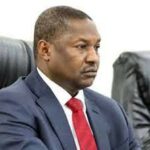
Reading my articles in PUNCH Newspaper and other media outlets, National Economy and The News Chronicles, one could ask who is this unabashed capitalist bourgeoisie? I am happy to inform anyone that I am not only a capitalist, I am a libertarian and probably Nigeria’s only libertarian.
And who is a libertarian? A libertarian is one who holds the belief — a strong one — that people should be free to think and, more importantly, do what they want without government involvement. A libertarian is not an anarchist, he just resents undue government control of the lives of the people and, in this instance, our economic life. From this description, we see a libertarian will key into the individualistic capitalist philosophy rather than the collectivism of socialism.
Nigeria it was that turned me into a libertarian in my later years, having been more of a social democrat in my young adult life. Passing through the university in the seventies my generation witnessed and participated in the debates between comrades on the left and bourgeoisie on the right as represented by the Soviets and the West respectively. We witnessed the ebbs and flows of both sides until the collapse of the USSR and the remaking of Communist China and lately Communist Vietnam.
The capitalist West appeared to have won the ideological battle and collectivism was in retreat except in North Korea and Cuba. All this while, Nigeria was playing both sides by declaring non-alignment and operating a mixed economy with the government at the commanding heights of the economy and individuals in commerce and light industries. Democratic socialism was the adopted philosophy of progressives and the consequence of these in practice was statism over economic liberalism not only in Nigeria but across Africa.
Later in life, I got to realise that the University of Ife (now Obafemi Awolowo University) was the bastion of the social democrats ably led by the late Professor Sam Aluko. I am not certain where those on the right are situated, University of Ibadan or University of Nigeria Nsukka? Also, last week I wrote on a foremost capitalist, Alhaji Aliko Dangote, so it is neat I dwell on a standard bearer for the socialist left.
Recently I availed myself of the writings and thinking of the doyen of Nigerian Democratic Socialism, the late Aluko, not his scholastic works but what he wrote for us non-scholars through a compendium of his speeches published after his death in 2012. More importantly, I had followed his anti-Structural Adjustment Programme position and his arguments against petrol subsidy removal. Being pro-structural adjustment I knew we camped in separate schools of economic thought.
Interestingly we are family, in-laws, and I had the opportunity to be schooled by him in Newcastle. He taught me the nuances of the M1 M2 M3 classification of money. We discussed Soludo’s CBN and other economic matters of that time. This was 2007 and socialism was in decline. Alan Greenspan’s (Chairman US Federal Reserve Board) book, Age of Turbulence, was out to celebrate capitalism’s triumph. Meanwhile, the crisis in global finance was unfolding and soon socialism would make a comeback assault on capitalism.
Prof never looked down on this jarring veterinarian pontificating in his field. He calmly heard my points and made his points. After reading and studying his works in some more detail I hope to arrive at a synthesis of both positions.
Where would Prof’s heart be in the current political dispensation with the emergence of All Progressives Congress after his demise? I believe he would be right in APC because he was opposed to the liberalisation policies of the Peoples Democratic Party. In fact, APC can be said to be using his craft book in the administration of the economy. We have fiat determination of the naira and maintenance of fuel subsidy and other statist policies. Of course, I would have confronted him with failures of the APC on the economic terrain.
Notwithstanding, I doubt Prof would have moderated his views even when confronted with other world examples where socialist leaders implemented or continued with liberal ideas. A prime example will be Brazil’s former president, Lula da Silva, who as president did not throw out his predecessor’s liberal policies but used them to generate further wealth, proceeds of which he used to address welfare issues for the poor in Brazil.
Prof’s proteges are well distributed in MDAs and universities. I was appalled a few years back when one of them writing in a newspaper said that if any student of his recommends depreciation of our currency as an economic tool, the student is guaranteed a failure, showing how stubbornly uncompromising they are. This is a policy that has worked so well for Asians. In Prof’s argument against depreciation of the naira, he said ‘Nigeria had nothing to export;’ this was in 1986. Almost 40 years later his proteges still argue we have nothing to export when opposing market determination of the naira value and necessary depreciation to encourage exports.
Read Also
Our problem of a lack of export propensity in response to a depreciating currency is due to the Import Substitution Industrial Policy we implemented before and after independence. This has made us an insular economy with the saving grace of oil dollars to finance payments for imports. Export-led industrialisation is the key not import substitution industrial policy.
Interestingly Prof and I are on the same page with the same desires. We are both welfarists; after the welfare of the people of Nigeria. It is the means to achieve this laudable aspiration that differs. My position is this, you have to create societal wealth sustainably before you can attend to the welfare of a society, starting with the weakest in that society. And it is individuals and private sectors of societies that create the wealth of a country, not the state or the government. This has been demonstrated and adopted by communist countries as well.
This is where we have missed it in Nigeria. We have left it to the government to spearhead the creation of societal wealth. Over time we have seen both schools of thought play out on the world scene and in Nigeria. We now have a statist regime in place with all types of interventions to create more wealth and increase gross domestic product without success. Seven years later, the economy is not even at its 2015 size of $464 billion.
There are examples of countries that started as socialist and statist but have changed to more liberal market-driven economic policies. I have mentioned Brazil, others are India, Communist China and Vietnam, Nyerere’s Tanzania and Chile. Not one of them, after adopting the more liberal policies, reversed them as Nigeria did in 2015.
Headwinds against reducing government influence come from unlikely quarters. First are established cadres of the private sector who use the government to restrict competition so they can run cartels and quasi-monopolies. This is apart from the fact that a large number of businesses depend on government largesse for their profits.
Another group where opposition to ‘hands-off government’ is deep-rooted is in academia and the Nigerian intelligentsia. This is because lots of them have lived on government all their lives. It is time to jettison ideological positions and allow for the pragmatism of what works, and what does work? Economic liberalisation has worked in Nigeria making the economic cake bigger threefolds in just 15 years. We need to put this horse of liberalisation before the cart of societal wealth distribution. This guarantees the sustenance of welfare programmes; this is the synthesis that Scandinavian countries have achieved.
This article has been written in honour of a great person. Though we belong to different schools of thought in developmental economics; he by scholastic achievement, me by osmotic assimilation into the libertarian camp, yet I acknowledge his immense contribution to the Nigerian State in honesty of purpose and never from impure motives or personal aggrandisement. I thank God I didn’t know Papa Aluko from a distance so I can attest to his purity of heart.
Dr Jaiyesimi writes from Sagamu; he can be reached [email protected], 08123709109
Copyright PUNCH.
All rights reserved. This material, and other digital content on this website, may not be reproduced, published, broadcast, rewritten or redistributed in whole or in part without prior express written permission from PUNCH.
Contact: [email protected]





